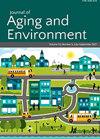A Study on Community Support Activities and Their Locations Considered by Older Retirees
IF 1
Q3 GERONTOLOGY
引用次数: 0
Abstract
AbstractThis study focuses on relationships between participation desire for community support activity, locations considered appropriate for activities, living situation and history of residence, and occupation through a survey of retired older people in Japan. Family and relatives living nearby strongly influence the preferred location for community support activities (CSA). Most older people believe public facilities should be used for CSA, but believe elementary schools are for children only. To ensure community use of elementary schools, it is important to promote their usefulness to older people who do not have a relationship with the school through their children or grandchildren.Keywords: CSAdesire for participationelementary school facilitiesolder retirees Notes1 A web-based survey system was used in this study. Through the representatives of the four organizations that agreed to participate in the survey, we distributed survey request forms to the members of the organizations, who then accessed the URL of the survey site and responded to the survey.2 An alumni organization of retirees of Daikin Industries, Ltd.3 Daiwa House Kansai Alumni Association. http://daiwa-ob.com(confirmed 17.4.24)4 Retirees’ Associations in 19 prefectures in total, Kanto, Tokai, and Kinki Chapters.5 Retirees’ association held in Nagaokakyo City, Kyoto Prefecture.6 Even when the number of CLs increased, most respondents remained biased toward one CL, and all the other CLs from which they derived were extremely small. Respondents included in the largest CL exhaustively selected many activities, and the lack of a clear selection trend was considered a characteristic of this CL.7 Although it is expected that the number of rented offices may be lower in suburban areas, it was determined that there would be no issue if there were no omissions in the facilities located in the area.8 The conversion of school facilities into community centers is mentioned by Ueno and Motono (Citation1997), and it is assumed that the situation will accelerate as residents voluntarily promote it. Under these circumstances, it is difficult to believe that the trend of utilizing elementary school facilities for community activities will progress. The purpose of this study was not to retrospectively determine the reasons for the current use of elementary school facilities but rather to determine the total willingness to use elementary school facilities for CSA, while also considering regional differences in the actual use of elementary school facilities.9 Public facilities, such as community centers, may have predetermined times and frequencies of use for certain rooms and locations, which may have influenced the results.10 Referring to the occupational classifications of the 2015 census and considering the characteristics of the companies surveyed (retiree associations and retiree coalitions of relatively large companies in the three metropolitan areas) the authors’ research group reconfigured the survey to allow for differences in the selection preferences for CSA. Ten corporate retirees were asked to confirm the validity of their choices prior to the survey; those occupations not included in any of the assigned categories were designated as “other.”Additional informationFundingThis work was supported by JSPS Grant-in-Aid for Challenging Exploratory Research Grant Numbers JP26560020.退休长者社区支援活动及地点研究
摘要本研究通过对日本退休老年人的调查,探讨社区支持活动的参与意愿、活动的适宜地点、居住状况和居住历史与职业之间的关系。居住在附近的家庭和亲戚对社区支持活动的首选地点有很大影响。大多数老年人认为公共设施应该用于CSA,但认为小学只适合儿童。为了确保社区使用小学,重要的是要通过子女或孙辈向与学校没有关系的老年人宣传小学的用处。关键词:csds参与意愿小学设施退休老人注1本研究采用基于网络的调查系统。通过同意参与调查的四个组织的代表,我们将调查申请表分发给组织的成员,然后他们访问调查网站的URL并对调查进行回应大金工业公司退休人员的同学会。3大和房舍关西同学会。http://daiwa-ob.com(confirmed 17.4.24)4关东、东海、近畿等共19个县的退休人员协会。5京都府长冈京市的退休人员协会。6即使在CLs数量增加的情况下,大多数受访者仍然倾向于一个CLs,而他们得出的所有其他CLs都非常少。在最大的区域清单中包括的受访者详尽地选择了许多活动,而缺乏明确的选择趋势被认为是该区域清单的一个特点。7虽然预计郊区租用办公室的数量可能会减少,但确定如果该地区的设施没有遗漏,则不会出现问题上野(Ueno)和元野(Motono) (Citation1997)提到了将学校设施转变为社区中心,并假设在居民自愿推动下,这种情况将会加速。在这种情况下,很难相信利用小学设施进行社区活动的趋势会继续下去。9 .本研究的目的不是追溯性地确定目前小学设施使用的原因,而是确定使用小学设施进行文化评价的总意愿,同时也考虑到小学设施实际使用的地区差异公共设施,如社区中心,某些房间和地点可能有预定的使用时间和频率,这可能会影响结果参考2015年人口普查的职业分类,并考虑到被调查公司的特征(三个大都市地区相对较大的公司的退休人员协会和退休人员联盟),作者的研究小组重新配置了调查,以允许对CSA的选择偏好的差异。在调查之前,十位公司退休人员被要求确认他们选择的有效性;那些不包括在任何指定类别中的职业被指定为“其他”。本研究得到了JSPS挑战性探索性研究资助基金号JP26560020的支持。
本文章由计算机程序翻译,如有差异,请以英文原文为准。
求助全文
约1分钟内获得全文
求助全文
来源期刊

Journal of Aging and Environment
Social Sciences-Sociology and Political Science
CiteScore
2.50
自引率
5.00%
发文量
21
 求助内容:
求助内容: 应助结果提醒方式:
应助结果提醒方式:


